Is Marketing Over?

The great paradox we face as marketers today is that marketing has simultaneously never been easier and never been harder.
You can blast off a message to the masses using any one of a countless number of tools, but getting someone to pay attention to your message, to actually hear what it is you’re saying, is harder than ever.
As consumers, we hate marketing.
This is not hyperbole.
Study after study confirms these findings—and I can’t imagine this is going to change anytime soon. Part of this animosity stems from the quality of ads, which are often gimmicky (or worse, irrelevant), and part of it stems from the sheer quantity of ads, which is nearly incomprehensible in scope.
According to this 2022 Forbes article, “the average American is exposed to anywhere between 4,000-10,000 ads per day.” I can only imagine that now, just two years later, that number has increased.
All of which is to say that marketers find themselves in a bit of a pickle.
Our challenge is to create marketing that hits the proverbial mark with its intended audience, both logically and emotionally, in the most creative and novel way possible, while understanding that our intended audience doesn’t want to hear from us at all.
Which is why it makes sense then to ask (or ask again) a fundamental question: Why do we do market in the first place?
The purpose of marketing
Pose this query to ten different marketers and you’ll get ten different responses: To create awareness, to create demand, to communicate, to build a brand—I’m sure you’ve got two or three answers in your head right now.
And each of those answers is technically correct, too—at least, historically, that’s been the case. Marketing does indeed have to do all that. But I wonder if there’s another, fundamental question we should also be asking, one that most of us have never actually considered: Do we need to market at all?
What if “marketing”—as a discipline, an activity, a department—is a concept that’s hurtling towards an inevitable extinction?
Right now, marketing operates at the intersection of customer needs and business offerings. It serves to bridge the gap between the two, addressing the barriers that prevent these two sides from connecting effectively.
When marketing is done “right,” by which I mean, when marketing is lucky enough to work, it does precisely this: connects the buyer with the seller. But what if those buyers, those mythical creatures that we spend so much of our time trying to get to look in our direction, simply leave the digital spaces we’ve been focused on?
Gartner predicts “a perceived decay in the quality of social media sites will push 50% of consumers to significantly limit their use of major platforms.”
Add to that the fact that AI-generated social media influencers are on the rise, AI-generated content is on the rise, AI-generated advertising is the on rise, AI use from the channels themselves is on the rise, and Gartner concludes that all of this works to “hasten the perception of diminished quality. As a result, consumers are actively limiting their use.”
The response to this could be for brands and marketers to try and chase their audiences to their next stop on the trend train. Indeed, many brands and marketers will do this.
But I think the smartest brands and marketers will use this channel volatility to turn their outward-looking marketing focus to an inward-facing brand focus.
AI is giving brands and marketers a supercharge, but this supercharge comes at a cost.
While AI can indeed make marketing easier, the jury is still out on whether it’s more effective—and we still have to deal with the fact that people, in general, hate marketing.
So, if there’s a trend towards using AI for hyper-personalization in marketing (this is one of the most frequently touted promises of AI), how does that realistically play out over the next couple of years? Does it become too personalized? Does it become too targeted? Do consumers and B2B buyers get so fed up that they use AI to fight the AI that brands are using, leading to a sort of marketing stalemate?
I actually think that’s quite possible, which is why I believe the real opportunity in front of us is to elevate the brand experience to a level never before seen, to spend a not-insubstantial amount of time identifying, understanding, and then enhancing every point of customer interaction with your brand.
A worthwhile thought experiment is to ponder what would happen if you could never market again.
Living within this constraint, you would likely spend every waking moment making sure that every time someone interacted with your brand—at your office, at a tradeshow, on a sales call, during a demo, on a test drive—each part of that interaction was dialed in and memorable.
By focusing on delivering exceptional experiences across the brand ecosystem, brands can cultivate a sense of authenticity and trust that marketing—no matter how good it is—could never accomplish.
When a brand consistently delivers on its promises and exceeds customer expectations in surprising and thoughtful ways, and does so with the goal of creating memorable experiences, it naturally establishes a strong emotional reference point and differentiates itself from competitors in a way that feels genuine and earned.
In the end, it’s the brand experience that matters most, not the best marketing. I can’t emphasize that enough.
AI will continue to democratize the competitive landscape and brands will no longer be able to hide behind good marketing.
So stop marketing and start crafting brand experiences that people will remember.
It’s not just the smart move—it’s the only move.
And the only sustainable path.


